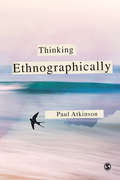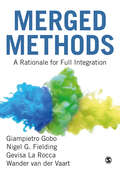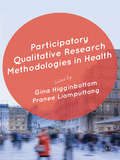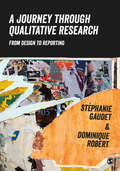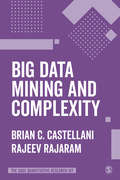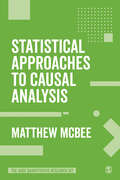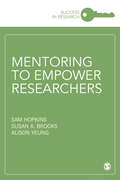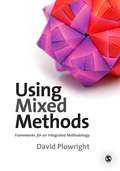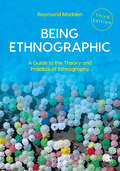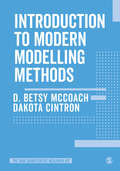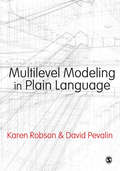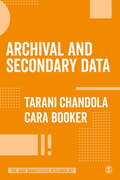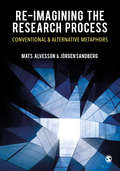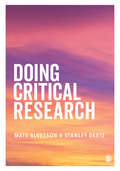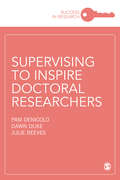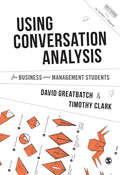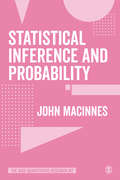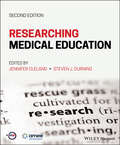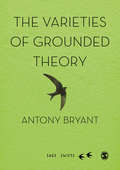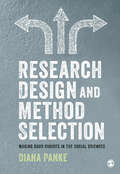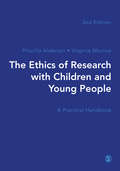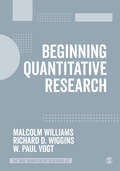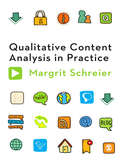- Table View
- List View
Thinking Ethnographically
by Paul AtkinsonWritten by a leading authority, this book discusses a wide range of analytic ideas that can and should inform ethnographic analysis. In introducing the notion of ‘granular ethnography’ it argues for an approach to qualitative research that is sensitive to the complexities of everyday social life. A much-needed antidote to superficial research and analysis, the text deals not merely with the practical methods of fieldwork, but with the far more ambitious enterprise of turning ethnographic data into productive ideas and concepts. Paul Atkinson enables us not merely to do ethnography, but truly to think ethnographically. His book will prove invaluable to students and researchers across the social sciences.
Merged Methods: A Rationale for Full Integration
by Giampietro Gobo Nigel G. Fielding Gevisa La Rocca Wander van der VaartA new turn in mixed methods research is here: merged methods. This provocative book offers a novel analysis of current mixed methods research, complicating traditional approaches and challenging existing techniques. Moving beyond the binary quantitative-qualitative distinction, the book presents methodologically grounded ways to merge methods in social research and integrate interpretive and structural approaches in one instrument or procedure. The book: Considers the importance of merging both epistemologies and methodologies. Showcases eight merged methods research approaches, from the Delphi method to multimodal content analysis. Explores the opportunities for merging methods using computational techniques, such as text mining. This innovative book is a must-read for any postgraduate student or researcher across the social sciences wanting to develop their understanding of mixed methods research.
Participatory Qualitative Research Methodologies in Health
by Pranee Liamputtong Gina HigginbottomThis guide to the essentials of doing participatory methods in a broad range of health contexts covers all of the stages of the research process, from research design right through to dissemination. With chapters from international contributors, each with many years’ experience using participatory qualitative approaches, it provides guidance on. - Ethical issues in Participatory Research - Designing and conduction Participatory Research projects - Data management and analysis - Researching with different populations - New technologies Packed full of up to date and engaging case studies, Participatory Qualitative Research Methodologies in Health offers a wide range of perspectives and voices on the practicalities and theoretical issues involved in conducting participatory research today. It is the ideal resource for students and researchers embarking upon a participatory research project.
A Journey Through Qualitative Research: From Design to Reporting
by Stéphanie Gaudet Dominique RobertThis hands-on guide takes students from start-to-finish through the research process while showcasing the complexities and interrelationships of different methods, schools of thought, and associated analytical strategies. Encouraging students to think of qualitative research as a flexible, cyclical process rather than a linear one, this book offers a panoramic strategy and dynamic approach to qualitative research that accommodates the fluid nature of research and accounts for lessons learned through lived experience. With an emphasis on the analysis stage—within case, across case, and the dialogue between these insights and existing literature—it uses concrete applications to show how your methodological decisions translate into practice. It covers: Forming, defending, and evaluating research questions Choosing a research approach Ensuring ethically sound research Collecting quality data Analyzing data in layers Reporting research results Through a conversational tone that unpacks key vocabulary and acts as a companion supervisor, this book equips you to traverse every step of the qualitative research journey.
Big Data Mining and Complexity (The SAGE Quantitative Research Kit)
by Rajeev Rajaram Brian C. CastellaniThis book offers a much needed critical introduction to data mining and ‘big data’. Supported by multiple case studies and examples, the authors provide: Digestible overviews of key terms and concepts relevant to using social media data in quantitative research. A critical review of data mining and ‘big data’ from a complexity science perspective, including its future potential and limitations A practical exploration of the challenges of putting together and managing a ‘big data’ database An evaluation of the core mathematical and conceptual frameworks, grounded in a case-based computational modeling perspective, which form the foundations of all data mining techniques Part of The SAGE Quantitative Research Kit, this book will give you the know-how and confidence needed to succeed on your quantitative research journey.
Statistical Approaches to Causal Analysis (The SAGE Quantitative Research Kit)
by Matthew McBeeThis book provides an up-to-date and accessible introduction to causal inference in quantitative research. Featuring worked example datasets throughout, it clearly outlines the steps involved in carrying out various types of statistical causal analysis. In turn, helping you apply these methods to your own research. It contains guidance on: Selecting the most appropriate conditioning method for your data. Applying the Rubin’s Causal Model to your analysis, a mathematical framework for understanding and ensuring accurate causation inferences. Utilising various techniques and designs, such as propensity scores, instrumental variables analysis, and regression discontinuity designs, to better synthesise and analyse different types of data. Part of The SAGE Quantitative Research Kit, this book will give you the know-how and confidence needed to succeed on your quantitative research journey.
Mentoring to Empower Researchers (Success in Research)
by Sam Hopkins Susan A Brooks Alison YeungMentorship can be a rewarding experience for both the mentor and the mentee. Within this context, this book provides guidance on how to set up mentorship programmes in your institutions, and the skills of an effective mentor, including: • Mentorship for transition points, • Skills development needed for publication, funding application and networking, • Mentorship for performing supervision duties. This is a practical and easy-to-use guide that draws on the editors’ extensive experience, and an invaluable tool for practitioners, career advisors and academics working in research and skills development.
Using Mixed Methods: Frameworks for an Integrated Methodology
by David PlowrightUsing Mixed Methods offers an innovative approach to social and educational research. The author sets out the case for research from an holistic perspective, integrating different methods, different data and overall research strategies. This book shows how to use an integrated methodology that meets the needs of the postgraduate researcher who wants to challenge the traditional paradigmatic view of research. The author explores: - The FraIM and its application to social and educational research - The contexts of research - Different methods of data collection - Types of data and their natural integration within the research process This book is for final year undergraduate and postgraduate students on social science and education courses. David Plowright is a lecturer in the Centre for Educational Studies at the University of Hull.
Being Ethnographic: A Guide to the Theory and Practice of Ethnography
by Raymond MaddenBeing Ethnographic is a fundamental introductory guidebook to process and utilization of doing fieldwork within real-world settings. It explores our understanding of identities, the future of ethnography and the advancing role of technology in a global, networked society. The third edition of Being Ethnographic highlights the challenges introduced by the ethnographers′ own interests, biases and ideologies and demonstrates the importance of methodological reflexivity. This fully updated third edition includes: Discussions on technology and multimodality as hands-on tools for the field Helpful insights into making thoughtful choices around a research design Aid in engaging ethically and effectively within the field Lasting tips for finalising and conducting research Raymond Madden provides invaluable guidance for applying fundamental ethnographic principles within the field and gives students and researchers everything they need to walk a mile in someone else′s shoes.
Introduction to Modern Modelling Methods (The SAGE Quantitative Research Kit)
by D. Betsy McCoach Dakota CintronUsing simple and direct language, this concise text provides practical guidance on a wide range of modeling methods and techniques for use with quantitative data. It covers: · 2-level Multilevel Models · Structural Equation Modeling (SEM) · Longitudinal Modeling using multilevel and SEM techniques · Combining organizational and longitudinal models Part of The SAGE Quantitative Research Kit, this book will give you the know-how and confidence needed to succeed on your quantitative research journey.
Multilevel Modeling in Plain Language
by David Pevalin Karen RobsonHave you been told you need to do multilevel modeling, but you can′t get past the forest of equations? Do you need the techniques explained with words and practical examples so they make sense? Help is here! This book unpacks these statistical techniques in easy-to-understand language with fully annotated examples using the statistical software Stata. The techniques are explained without reliance on equations and algebra so that new users will understand when to use these approaches and how they are really just special applications of ordinary regression. Using real life data, the authors show you how to model random intercept models and random coefficient models for cross-sectional data in a way that makes sense and can be retained and repeated. This book is the perfect answer for anyone who needs a clear, accessible introduction to multilevel modeling.
Archival and Secondary Data (The SAGE Quantitative Research Kit)
by Tarani Chandola Cara BookerData archives provide rich and expansive sources of information for researchers. This book highlights the utility of secondary data analyses whilst showing you how to select the right datasets for your study, and in turn get the most out of your research. Topics include: · Generating your research question · Selecting appropriate datasets and variables · Examining univariate, bivariate and multivariate associations · Visualisng your data with tables and graphs Part of The SAGE Quantitative Research Kit, this book boosts students with know-how and confidence, to help them succeed on their quantitative research journey.
The Anatomy of the Case Study
by Gary Thomas Kevin MyersThis sharp, stimulating title provides a structure for thinking about, analysing and designing case study. It explores the historical, theoretical and practical bones of modern case study research, offering to social scientists a framework for understanding and working with this form of inquiry. Using detailed analysis of examples taken from across the social sciences Thomas and Myers set out, and then work through, an intricate typology of case study design to answer questions such as: How is a case study constructed? What are the required, inherent components of case study? Can a coherent structure be applied to this form of inquiry? The book grounds complex theoretical insights in real world research and includes an extended example that has been annotated line by line to take the reader through each step of understanding and conducting research using case study.
Re-imagining the Research Process: Conventional and Alternative Metaphors
by Mats Alvesson Jorgen SandbergThis book offers a unique solution to the shortage of more imaginative and engaging research by re-imagining the core elements of the research process. In contrast to existing methods, which mainly focus on standard ingredients in the research process, the metaphorical approach taken here offers a more varied and comprehensive platform for producing novel, influential and relevant research. The set of guiding principles suggested in the book provides researchers with the resources to break away from existing conventions and templates for conducting and writing research. Re-imagining the Research Process: Conventional and Alternative Metaphors is suitable for upper-undergraduate and postgraduate students and researchers interested in challenging traditional views of the research process. Mats Alvesson holds a chair in the Business Administration department at Lund University in Sweden and is also a part-time professor at University of Queensland Business School, Australia and at Cass Business School, UK. Jorgen Sandberg is Professor at UQ Business School, University of Queensland, Australia, and Distinguished Research Environment Professor in Organization Studies at the Warwick Business School, UK.
Doing Critical Research (Sage Series In Management Research Ser.)
by Mats Alvesson Stanley DeetzThis title builds on the success of Doing Critical Management Research which has proven to be a seminal text in the 20 years since publication. In 2020, Alvesson and Deetz have broadened their focus and updated the original book to offer relevance to critical research across all of the social sciences. In reflecting contemporary theoretical and methodological turns over the past few decades, it includes coverage of key contemporary topics such as race, gender, postmodernism and intersectionality. With examples throughout, the authors provide an authoritative and insightful framework for navigating critical theories and methods and sets out a new agenda for critical research undertaken today.
Supervising to Inspire Doctoral Researchers (Success in Research)
by Julie Reeves Pam Denicolo Dawn DukeEarly careers researchers and academics receive little to no on-going training for providing support to doctoral students. In light of this, this book addresses the needs of prospective and current supervisors of doctoral students, by providing you with guidance on: • Engaging with the process of selecting researchers and developing reliable expectations, • Identifying the most effective supervisory style and your role in shaping students’ skills, • How you can contribute to your students’ progress and reflective practices, • Your role in the final assessment stages, and how your support can extend beyond their studies. Through a wide range of multidisciplinary case studies, you will find valuable guidance on how to support your students, and be empowered in the process.
Using Conversation Analysis for Business and Management Students (Mastering Business Research Methods)
by Timothy Clark David GreatbatchIn Using Conversation Analysis, David Greatbatch and Timothy Clark introduce the key elements of conversation analysis, an increasingly prominent form of business research analysis, which involves analysing audio and visual recordings of naturally occurring talk-in-interaction such as television speeches and interview exchanges, to see how meanings are constructed. Ideal for Business and Management students reading for a Master’s degree, each book in the series may also serve as reference books for doctoral students and faculty members interested in the method. Part of SAGE’s Mastering Business Research Methods Series, conceived and edited by Bill Lee, Mark N. K. Saunders and Vadake K. Narayanan and designed to support researchers by providing in-depth and practical guidance on using a chosen method of data collection or analysis.
Statistical Inference and Probability (The SAGE Quantitative Research Kit)
by John MacInnesAn experienced author in the field of data analytics and statistics, John Macinnes has produced a straight-forward text that breaks down the complex topic of inferential statistics with accessible language and detailed examples. It covers a range of topics, including: · Probability and Sampling distributions · Inference and regression · Power, effect size and inverse probability Part of The SAGE Quantitative Research Kit, this book will give you the know-how and confidence needed to succeed on your quantitative research journey.
Researching Medical Education
by Jennifer Cleland Steven J. DurningRESEARCHING MEDICAL EDUCATION Researching Medical Education is an authoritative guide to excellence in educational research within the healthcare professions presented by the Association for the Study of Medical Education and AMEE. This text provides readers with key foundational knowledge, while introducing a range of theories and how to use them, illustrating a diversity of methods and their use, and giving guidance on practical researcher development. By linking theory, design, and methods across the spectrum of health professions education research, the text supports the improvement of quality, capacity building, and knowledge generation. Researching Medical Education includes contributions from experts and emerging researchers from five continents. The text includes information on: Developing yourself and your practice as a health professions education researcher Methods and methodologies including ethnography/digital ethnography, visual methods, critical discourse analysis, functional and corpus linguistics, critical pedagogy, critical race theory and participatory action research, and educational neuroscience methods Theories including those where relationships between context, environment, people and things matter (e.g., complexity theory, activity theory, sociomateriality, social cognitive theories and participatory practice) and those which are more individually focused (e.g., health behaviour theories, emotions in learning, instructional design, cognitive load theory and deliberate practice) Includes 10 brand new chapters Researching Medical Education is the ideal resource for anyone researching health professions education, from medical school to postgraduate training to continuing professional development. “This is an extraordinary text that combines theory and practice in medical education research. The authors represent the who’s who of medical education research, and their wisdom and insights will help guide novice and experienced researchers alike.” —David M. Irby, Professor Emeritus of Medicine, University of California, San Francisco, USA “Research in health professions education is maturing. This is clearly evidenced by the second edition of Researching Medical Education. In 30 chapters this book takes you on an exciting voyage on research theories and research methodologies. This book is a comprehensive resource for anyone engaging in research in health professions education.” — Cees van der Vleuten, former Director of the School of Health Professions Education, Maastricht University, The Netherlands
The Varieties of Grounded Theory (SAGE Swifts)
by Antony BryantThe Varieties of Grounded Theory explores the range and depth of grounded theory methodology, and the ways in which discussions in the field have developed and expanded in recent years. In this SAGE Swift, Anthony Bryant provides a jargon-free overview of grounded theory terminology, whilst examining the impact of recent technological and theoretical advances on how it is currently practiced. Increasingly popular outside of its original settings, grounded theory is now a core method for business & management, criminology, politics, geography and psychology. This book provides a global interdisciplinary perspective on the method′s utility today, and complements The SAGE Handbook of Current Developments in Grounded Theory (April 2019).
Research Design & Method Selection: Making Good Choices in the Social Sciences
by Diana PankeHeavily grounded in helping students make the best choices for their projects, this book explores how to develop and work with theory, research questions, and method selection to build solid, logical proposals and move from research concepts to fully realized designs. Rather than rushing initial planning stages or reverse engineering questions from preferred methods, it encourages students to challenge unconscious biases around method selection and analysis and provides step-by-step guidance on choosing a method that is in-line with the question being explored. Focused on the role of the researcher within research design, it stresses the need to consider the theoretical underpinnings of research and not just practical issues when designing a project. It provides a sophisticated toolkit to understand: - The critical issues associated with both qualitative and quantitative methods - The approach that works best for specific research questions - How design choices can affect practice. Perfect for upper undergraduate and postgraduate students, this book will instil confidence and good decision making to ensure constructively informed design and practice.
The Ethics of Research with Children and Young People: A Practical Handbook
by Priscilla Alderson Virginia MorrowA practical guide to carrying out ethical research with children and young people, this practical handbook examines the ethical questions that arise at each stage of research, from first plans to dissemination and impact. Illustrated with case studies from international and inter-disciplinary research, it offers advice for addressing each ethical question, issue or uncertainty. Including: • A showcase of the best practice on a range of topics including data protection • Practical guidance for responding to recent global changes in policy and practice in ethics and law • Discussion of the challenges and opportunities of digital research with children The updated second edition continues to provide an excellent resource for those exploring the old, current and new consensuses on the ethics of researching with children.
Beginning Quantitative Research (The SAGE Quantitative Research Kit)
by Malcolm Williams Richard D. Wiggins W.P. VogtThis concise text provides a clear and digestible introduction to completing quantitative research. Taking you step-by-step through the process of completing your quantitative research project, it offers guidance on: · Formulating your research question · Completing literature reviews and meta-analysis · Formulating a research design and specifying your target population and data source · Choosing an appropriate method and analysing your findings Part of The SAGE Quantitative Research Kit, this book will give you the know-how and confidence needed to succeed on your quantitative research journey.
Qualitative Content Analysis in Practice
by Margrit SchreierQualitative content analysis is a powerful method for analyzing large amounts of qualitative data collected through interviews or focus groups. It is frequently employed by students, but introductory textbooks on content analysis have largely focused on the quantitative version of the method. In one of the first to focus on qualitative content analysis, Margrit Schreier takes students step-by step through: - creating a coding frame - segmenting the material - trying out the coding frame - evaluating the trial coding - carrying out the main coding - what comes after qualitative content analysis - making use of software when conducting qualitative content analysis. Each part of the process is described in detail and research examples are provided to illustrate each step. Frequently asked questions are answered, the most important points are summarized, and end of chapter questions provide an opportunity to revise these points. After reading the book, students are fully equiped to conduct their own qualitative content analysis. Designed for upper level undergraduate, MA, PhD students and researchers across the social sciences, this is essential reading for all those who want to use qualitative content analysis.
Archival and Secondary Data (The SAGE Quantitative Research Kit)
by Tarani Chandola Cara BookerData archives provide rich and expansive sources of information for researchers. This book highlights the utility of secondary data analyses whilst showing you how to select the right datasets for your study, and in turn get the most out of your research. Topics include: · Generating your research question · Selecting appropriate datasets and variables · Examining univariate, bivariate and multivariate associations · Visualisng your data with tables and graphs Part of The SAGE Quantitative Research Kit, this book boosts students with know-how and confidence, to help them succeed on their quantitative research journey.
